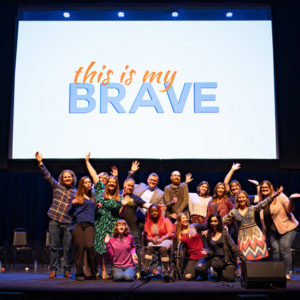Lessons Learned by an Olympian Recovering from Bipolar
Today’s guest blog is about how an incredible Olympic athlete dealt with a bipolar diagnosis and went on to thrive. Please welcome Amy Gamble to our community to share her story.
The Olympics are one of my favorite events of all time. I may be a bit biased since I was a 1988 Olympian. I have a great appreciation and understanding for all the sacrifices and hard work it takes to stand on a world stage and compete.
In my days of training for the 1988 Games in a sport called Team Handball, we lived for a few years full-time at the Olympic Training Center in Colorado Springs, Colorado. It was an amazing experience and one that challenged me physically, emotionally and mentally. I learned many things on the road to the Olympics, but the biggest lesson was to not let anyone or anything stop me from achieving my dreams. This lesson would become critically important after my life was interrupted by a mental illness – bipolar disorder.
In 1999 I was diagnosed with type I bipolar disorder with psychotic features. I was hospitalized after a crisis situation. Even though I had every opportunity to learn how to manage my illness, I was overwhelmed with a horrible amount of self-stigma. I wanted no part of a group of people who were discriminated against and thought less of in our society. No, the mentally ill was not a group I wanted any association with. In fact, I did not want the label and I wrongly assumed I would never have another episode of bipolar disorder. I suppose I believed if I ignored it there was a good chance it would go away.
Without treatment my illness got worse overtime and I eventually found myself alone, isolated and without a job to support myself. I had spent 16 years working in the business world in positions of sales, marketing and leadership. I had a very good reputation that all dissolved because of untreated bipolar disorder.
Losing my job affected more than my lifestyle it nearly took the life out of me. I was already in a very dark, depressed state of mind and losing my job because of a mental illness only compounded my emotional pain. At one point I asked myself to choose a recovery path and fight for my life back or just give up trying. I chose to recover and eventually began to focus on getting well.
I looked at bipolar disorder like I would a sports competitor. I analyzed the signs and symptoms. I monitored how they affected me. I decided I was going to beat bipolar disorder. Nothing was going to keep me from my dream of recovery.
Fortunately there have been many people who are so gracious to share their stories of living with a mental illness. I have benefitted by the inspiring stories of people who have found treatment plans and have recovered. Elyn Saks, a professor of law at the University of Southern California who happens to live with schizophrenia is one of my biggest heroes.
“You can have a good life living with a mental illness. It is not a sentence to a painful, bleak life.”
About six years ago I decided when I recovered I was going to become a Mental Health Advocate. I bargained in my prayers that if I could get well I would reach back and help other people.
Almost three years ago I began blogging about my journey with bipolar disorder. I have shared some of the times I have struggled and what had helped me get better. At one point I started to share my articles on Facebook, because it is one thing to share your journey with strangers and another to be open and honest with the people who are your friends. Much to my pleasant surprise people have really stepped up and been extremely supportive of me. The label, bipolar disorder and my willingness to talk openly about some of my struggles has been empowering for me and for other people.
Everyone has a different idea of what recovery is, but I believe it is about having a full life where the focus is not all about a mental illness but rather learning to live well in spite of it. It is easy to become consumed by the challenges we have particularly when an illness disrupts how we live our lives. However, it is essential to know living a full life is more than possible.
Becoming an Olympic athlete taught me dreams really do come true. Recovering from bipolar disorder has reinforced the whole idea of never giving up on that dream. My next big dream is to speak nationally about my recovery journey.
Having been an Olympian I can honestly say recovering from a mental illness was by far more difficult than training for the Olympics. My recovery is something I am immensely proud of and if you are on the journey toward recovery I hope you are proud too.
I hope my talks and my story will inspire others toward a vision of recovery. Because nothing is impossible if you are willing to dream and then take the steps necessary to make your dream come true.
*****
About the Author
Amy Gamble, M.A. had the honor of representing the U.S. at the 1988 Summer Olympics in Seoul, Korea. She was an All-American High School Basketball player from John Marshall High School and went on to play college basketball at the University of Tennessee and the University of Arizona. In 2004, Amy was inducted in the O.V.A.C. Hall of Fame.
In 2014, Amy began speaking publicly about her journey with bipolar disorder. She teamed up with the National Alliance on Mental Illness of Greater Wheeling (NAMI) to raise awareness in the community on mental illness. Through her talks and presentations Amy brings mental illness out of the shadows and gives hope to her audiences that recovery is possible.
You can find Amy’s blog – Shedding Light on Mental Illness at amygamble.com

